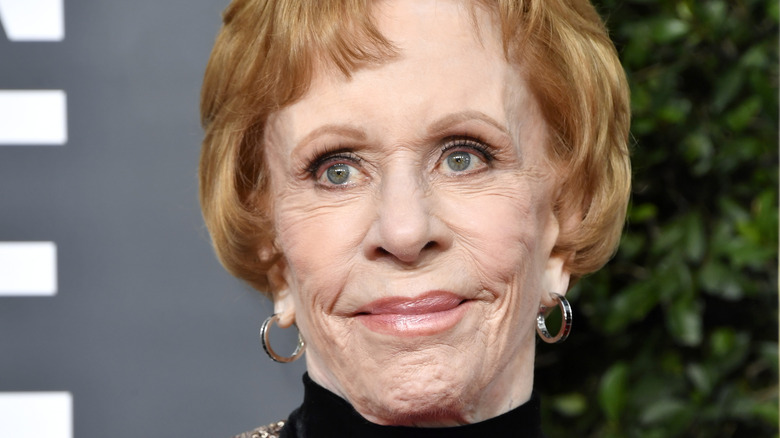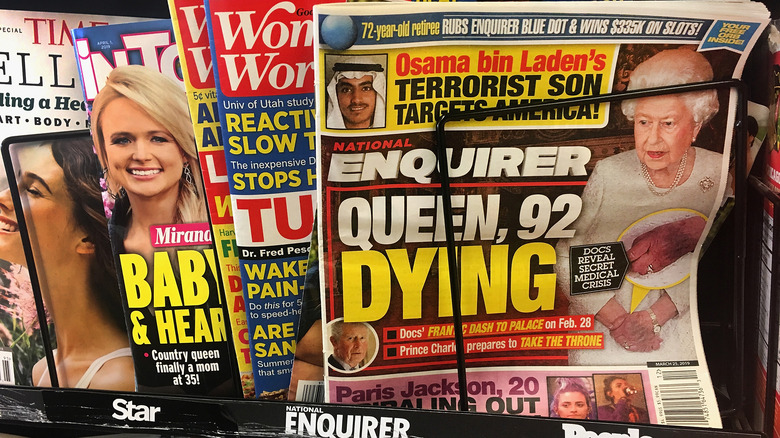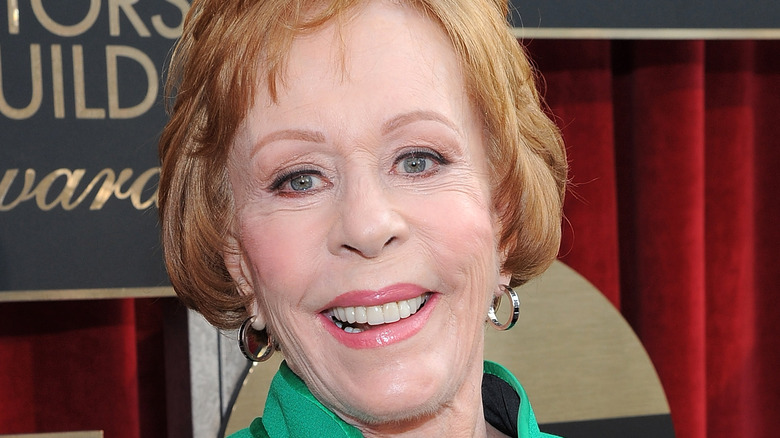Carol Burnett's Lawsuit With The National Enquirer Explained
In the 1970s, actress Carol Burnett was a household name (per IMDb). Famous for her hilarious sketches and charming personality, Burnett was the star of "The Front Page," "Twigs," and her own sketch show, "The Carol Burnett Show." However, in that same decade, Burnett would get in a huge legal battle with a tabloid publication, the National Enquirer, over a short article written about the actress.
The Court of Appeal of California via Casetext reports that on March 2, 1976, The National Enquirer wrote four sentences about actress Carol Burnett. That week, it published an edition of the magazine which had a headline stating, "Carol Burnett and Henry K. in Row." The article would go on to describe a night at a Washington D.C. restaurant in which Burnett and Henry Kissinger reportedly got into an argument after Burnett imbibed too much.
The National Enquirer wrote that Burnett went around letting everyone taste her dessert, and then spilled a glass of wine on someone. To finish the piece, the magazine reported that this person was unamused to have wine spilled on them and retaliated by spilling water on Burnett. After the article's publication, Burnett contacted her lawyers, and within a week, her team demanded the magazine retract the piece or issue a correction. When it didn't, the case went to the courtroom. United Press International reported that Burnett was completely sickened by the allegations the magazine made. The New York Times reports that Burnett claimed the article about her was not only untrue, but also libelous.
Courts say Enquirer is not a newspaper
The Washington Post reports that the Enquirer tried to claim that it was a newspaper, not a magazine, since the two are held to different journalistic standards. But the Los Angeles Superior Court disagreed and ruled that the Enquirer was a magazine, and therefore needed to issue a retraction on Burnett's article. The Court of Appeal of California via Casetext reports that in April 1976, just over a month after the article ran, the magazine did issue a retraction, writing, "We understand these events did not occur and we are sorry for any embarrassment our report may have caused Miss Burnett."
But that wasn't enough for Burnett. While her career wasn't harmed by the article, she was affected on a personal level, per The Washington Post. Her parents suffered from alcoholism and she publicly decried drug and alcohol abuse. Plus, she was offended at being accused of "physically abusive" acts, and called the article "a pack of lies." Burnett said that she was also accosted by strangers on the street who read the article, like a taxi driver who said, "Hey, Carol, I didn't know you liked to get in fights." Money and time were no matter to Burnett — she just wanted the Enquirer to be held accountable for the falsehoods it published.
If you or anyone you know is struggling with addiction issues, help is available. Visit the Substance Abuse and Mental Health Services Administration website or contact SAMHSA's National Helpline at 1-800-662-HELP (4357).
Burnett won over $1 million in damages
Plus, United Press International reports that Burnett wasn't the only celebrity who had an issue with the magazine's journalistic practices. The National Enquirer wrote that Rory Calhoun had a terminal cancer diagnosis and Paul Lynde was described similarly to Burnett as a rowdy drunk; both celebrities sued the publication. By 1981, at least ten celebrities or their acquaintances sued the National Enquirer for its faulty reporting on their personal lives.
The National Enquirer claimed to have spoken with a source who knew the restaurant's maitre d' who spilled details about that night with Burnett and Kissinger (per The Washington Post). Despite what the National Enquirer wrote, Burnett claimed the evening actually went quite differently. She wasn't drunk, she said, but had two or three glasses of wine. She only left the table to use the restroom, and said it was a "wonderful evening." The actress also said that she was just briefly introduced to Kissinger, who she was going to see the next night at a White House event.
The New York Times reports that Burnett ended up settling the case, and although she had previously asked for much more money, she was awarded $1.3 million in punitive damages, plus another $300,000 in general damages. After receiving the verdict in 1981, Burnett agreed to never publicly talk about the settlement. Per The Washington Post, in the end, Burnett basically made $24,242 per word that the National Enquirer wrote about her.


